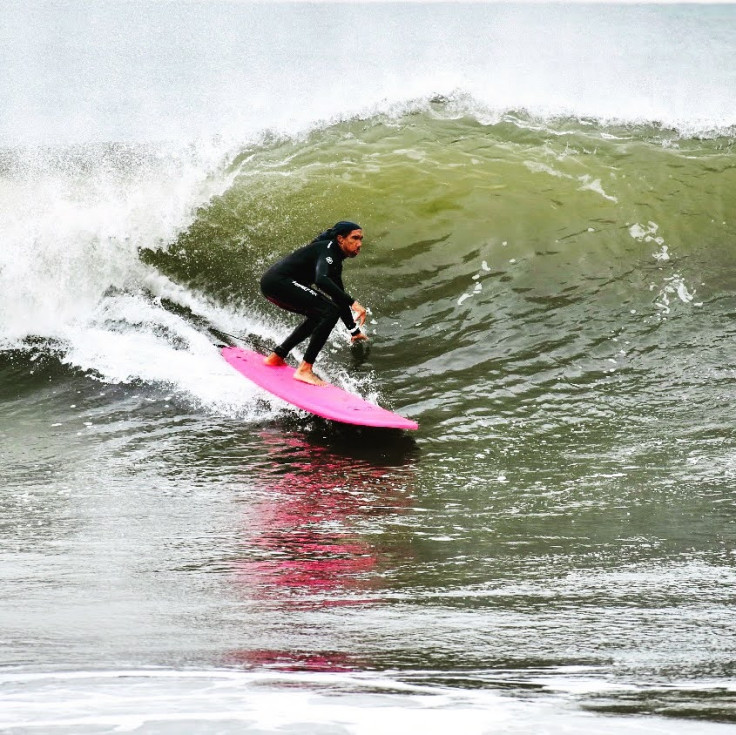Exploring Surf Therapy: How Dr. Kwame LaBassiere Is Bringing Ocean-Based Mental Health to the World

Surfers are often heard saying the line, "only a surfer knows the feeling," when asked about their experience. This phrase isn't meant to exclude, but to capture something ineffable: the way grief, guilt, trauma, or anxiety can lift momentarily when one steps into the water, catches a wave, or simply sits by the shoreline. For many, surfing is an athletic pursuit or lifestyle. Yet for others, especially those seeking an emotional catharsis, surfing has proven to be something deeper: a form of therapy that can touch the soul.
Dr. Kwame LaBassiere, board member of the International Surf Therapy Organization (ISTO), knows this truth intimately. In the aftermath of surviving a national tragedy in 2001, when survivor's guilt weighed heavily on him, he wandered to the beach, got hold of a surfboard, and rode his first wave. For a moment, all the grief and chaos he carried washed away. "Life felt lighter in the water," Dr. LaBassiere recalls. "Once you step into the water, you forget about everything else, and you leave feeling like you've accomplished something. It's an unparalleled feeling."
Those few moments of complete catharsis became a breakthrough for Dr. LaBassiere. The water offered clarity, release, and a kind of healing that traditional language often struggles to describe.
Dr. LaBassiere's deeply personal experience is mirrored in growing scientific evidence. Research consistently shows that time in "blue spaces," such as oceans, rivers, and other bodies of water, improves well-being. A recent survey of 569 Australian surfers found that more than 75% believed surfing improved their mental health, physical health, stress management, and social relationships. These statistics confirm what surf therapy practitioners see daily: surfing doesn't simply entertain; it heals, and it does so across multiple dimensions.
Physically, surfing is a rigorous, full-body sport that strengthens balance, endurance, and coordination while immersing participants in cold water known to boost dopamine and serotonin. Mentally, it can provide an outlet for stress, interrupting cycles of rumination with the immediacy of waves and a powerful breeze.
For people living with PTSD, including military veterans, surf therapy programs have shown measurable reductions in symptoms. Emotionally, surfing can provide a release. Dr. LaBassiere describes the ocean saltwater mingling with his tears as a ritual of letting go, using the ocean as a place of mourning or emotional release, allowing the water to carry the grief away.
But surf therapy is not only about the individual. It is also about community. Unlike traditional therapy, where one sits alone across from a professional, surf therapy often unfolds in groups. Paddling together, waiting for waves, or simply sitting quietly in the water creates an unspoken solidarity. For children with autism, at-risk youth, first responders, or people living with special needs, that sense of belonging can be as therapeutic as the ocean itself.

Still, the growing popularity of surf therapy requires careful oversight to ensure that it remains safe, ethical, and effective. This is where ISTO comes into play.
As an umbrella organization overseeing a plethora of regulating groups worldwide, ISTO sets the standards that protect both participants and practitioners. To be recognized, organizations must prove that they have the proper training, certifications, and therapeutic qualifications.
Adaptive surfing requires specialized knowledge. Those teaching must know CPR, safety protocols, and how to support people with complex needs or emotional sensitivities. Its evidence-based research and governance within its modalities underpin the movement, ensuring that surf therapy is not just well-intentioned but truly impactful.
ISTO also pushes to address gaps in access, representation, and wellness. Surfing, often portrayed in mainstream media as a sport of privilege and entertainment, is being reclaimed as a tool for all people, including marginalized communities who may lack proximity to beaches or resources to participate.
Through podcasts like WeSurf Media, Dr. LaBassiere is building networks, sharing research, and advocating for funding, along with ISTO's efforts to consistently work toward breaking down those barriers. As Dr. LaBassiere stresses, surf therapy is not a miracle cure; it is not about promises of instant transformation, but it is an accessible, natural, profoundly human, and transcendental pathway to well-being.
In the end, surfing's therapeutic power lies in its ability to restore balance between body, mind, and soul, along with fostering community and reminding people of their innate connection to water. Under the guidance of Dr. LaBassiere and organizations like ISTO, surf therapy is gaining recognition as a legitimate, evidence-based practice, going beyond its popular perception of a leisure pursuit.
The ocean has always been vast, humbling, and eternal; surf therapy simply helps listen to what it has been saying all along. As Dr. LaBassiere puts it, "The ocean doesn't judge, it doesn't ask questions, it just takes you as you are. And in that space, healing becomes possible."
© Copyright IBTimes 2025. All rights reserved.





















